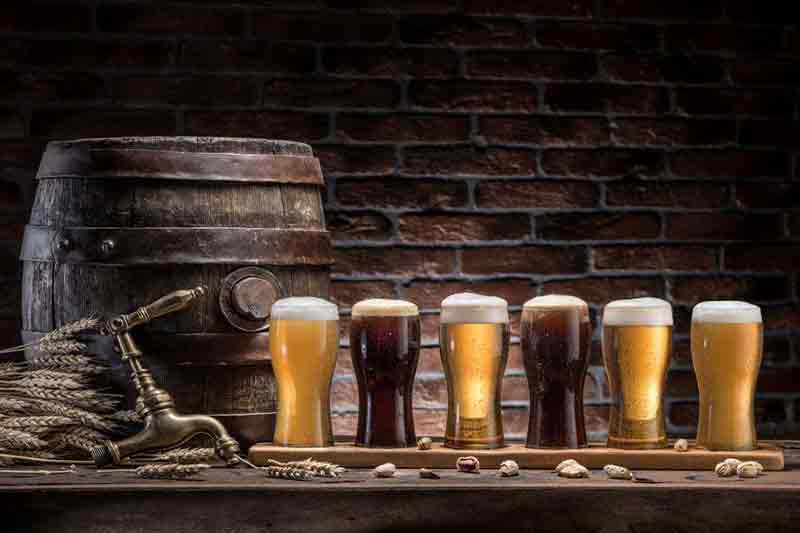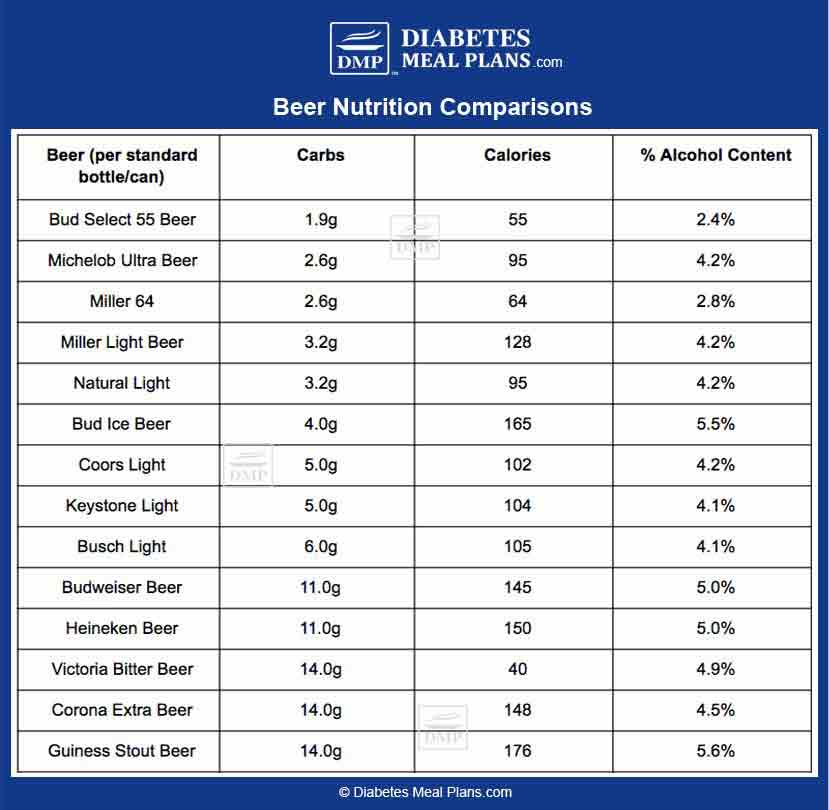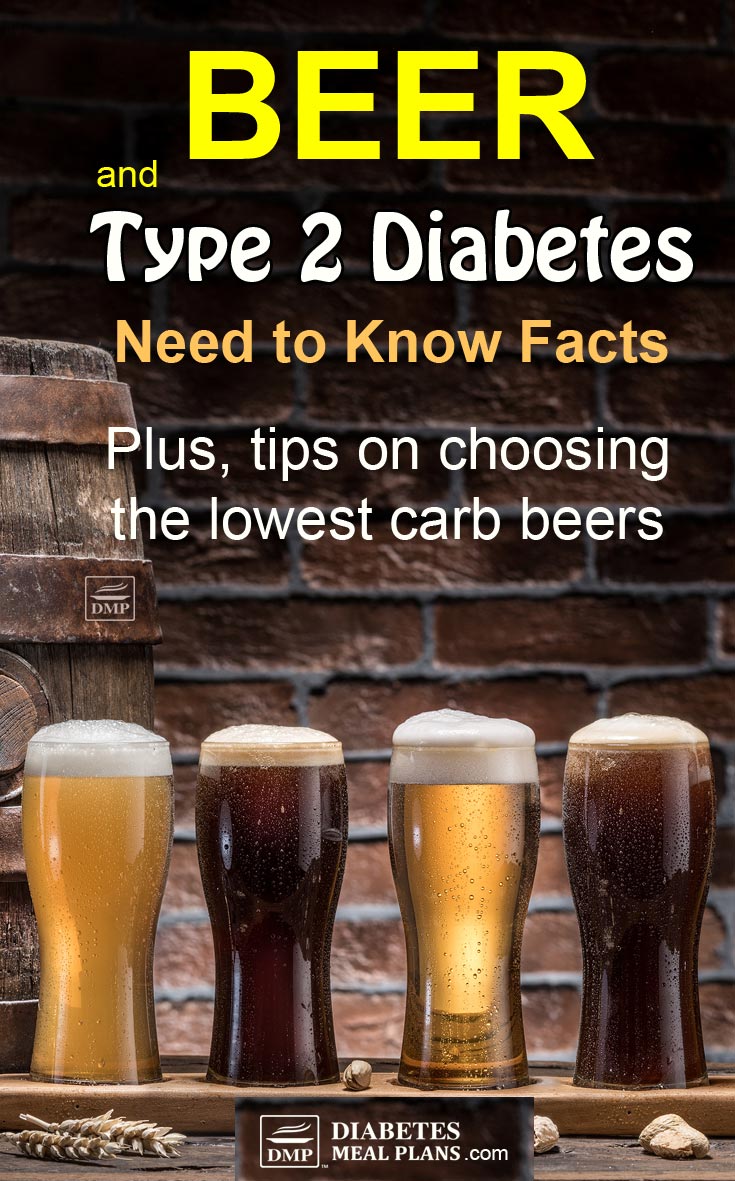Table of Contents[Hide][Show]
If you love beer you’ll appreciate how wonderful it is to crack a bottle open on a hot summer day. But beer and diabetes, is it safe to drink?
Great question!
Let’s explore the answer, along with looking at a list of beers and their calories, carbs and alcohol content so if you do choose to indulge, you can pick the very best options.

How is Beer Made?
Beer is an alcoholic drink that dates back thousands of years to some of our earliest ancient civilizations. While the process of brewing beer has evolved over the years, it classically starts with barley (a grain), hops (a small green flower), yeast (a fungus), and water.
Barley, or the grain of choice is dried, mashed and then steeped in hot water. The liquid is then boiled with hops and other flavorings. Hops are the ingredient that give beer its distinctive bitterness. Finally, yeast is added to the mixture to create a fermentation reaction, which produces the alcohol. The beer is bottled and then aged between a few weeks to a few months before serving.
Beer Nutrition Facts
Beer contains carbohydrates, but no protein or fat – talk about a bad combination for your blood sugar levels! Beer is also pretty calorically dense, especially considering how nutrient void it is.
One gram of alcohol contains 7 calories. To help put that into perspective, 1 gram of carbohydrate or protein each contains only 4 calories. Just a sip of alcohol is over 1 gram so you can imagine how quickly a whole glass or bottle adds up in terms of calories!
Traditionally, beer ranges from about 4%- 6% alcohol content, although certain varieties are much higher.
As you can imagine beer is not the best way to get your fill of nutrients. While it does contain a small amount of antioxidants, potassium, and B vitamins, obviously, eating real food will give you far more nutrients!
One of the main reasons to consider avoiding alcohol is because it is considered a toxin to your body. In other words, it’s a foreign substance that your body will try to filter out as soon as possible. And with excessive intake, over time and with enough toxic build up, alcohol can lead to irreversible organ damage to areas such as your liver or brain.
And unfortunately, alcohol is not really conducive to good blood sugar control either.
Beer Comparisons
As far as specific calorie and carb content, it will vary depending on the type of beer. You may already be familiar that many beers come in a traditional form, and also have a “light” counterpart.
Light beer is brewed to be lower in calories, oftentimes meaning it’s lower in alcohol content as well. As of recent, some beers are now specifically labeled “low carb beer,” and again, these are brewed in a slightly different way to make them a healthier choice. And certainly, the type of beer you choose is important.
Use the table below to see how some popular brews stack up in terms of carbs, alcohol and calories.

Research on Beer and Diabetes
As you might have expected, very little research has been conducted with regards to beer and treatment of type 2 diabetes or prediabetes. Just picture the term “beer belly” and think about what else you associate with your health!
Due to growing amounts of research, what we do know is that a low carb diet is effective in lowering blood sugar and A1c. For instance, a review of 7 clinical trials found that a low carb diet outperforms a low fat diet – the opposite of what you might expect. In fact, 52% of people eliminated their need for medications after changing to a low carb diet. We’ve seen this happen in real life with our members too – read their testimonials here.
So, while some beers might “fit” into your carb allotment for the day, keep in mind that beer is still void of any good quality nutrition. Overall, healthy whole foods will assist with your diabetes treatment and the goals that you want to achieve – lower blood sugar and A1c, weight loss etc. Therefore, for the carbohydrates you’re consuming, we encourage non-starchy vegetables, and small amounts of beans and lower carb fruits. These foods are very rich in vitamins, minerals, and fiber.
And remember, treatment of type 2 diabetes is different from prevention of type 2 diabetes. Which means, if you’re prediabetic, alcohol should be consumed with caution as well.
When researchers followed nearly 85,000 women for 16 years to assess what lifestyle factors are linked to the development of type 2 diabetes. They found that people who had a healthy BMI, did regular exercise, followed a healthy diet, consumed alcohol moderately and did not smoke, had a 90% lower risk of developing diabetes – we’ve all heard this type of diet and lifestyle advice, right?
Moderate alcohol intake is considered to be:
- 1 drink per day for women and 2 for men.
- 1 drink = 5 oz wine, 12 oz beer, 1.5 oz hard liquor.
Of course, it’s well known that excessive alcohol consumption is ill-advised for your health. But you may be wondering where that good/bad cutoff occurs?
A study in which 8000 university graduates were followed for 6 years, found that consuming any more than 7 drinks per week increases your risk of developing metabolic syndrome – aka, prediabetes.
Please pin, tweet or share this info; then keep reading – thanks!

Conclusion
Be aware that all alcohol is a toxin to the body. Beer will not provide any nutrition or benefit to your body. And it’s not exactly a blood sugar friendly beverage either.
So, the takeaway message is: Minimize beer as much as possible!
With that being said, it’s understandable that the occasional beer may be warranted and enjoyed – let’s face it, social events are always going to occur. And while some people may be happy ordering a club soda and lime from the bartender, you may enjoy the odd beer. If that’s the case, your best bet is to pick a low carb beer.
Some examples include:
- Bud Select Light Beer
- Michelob Ultra Beer
- Miller 64
Just remember, when consuming alcohol, stick to your daily limit and follow these simple ‘rules:’
- Check your blood sugar first!
- You shouldn’t drink if your blood sugar is too high or low or is unstable (rising and falling quickly).
- Keep your consumption to 1 (women) and 2 (men) drinks per day.
- 1 drink = 5 oz wine, 12 oz beer, 1.5 oz hard liquor.
- Don’t drink on an empty stomach.
- Food will help slow the effects of alcohol.
- Choose wisely.
Please pin, tweet or share this info to help others – thanks!

Leave a Reply